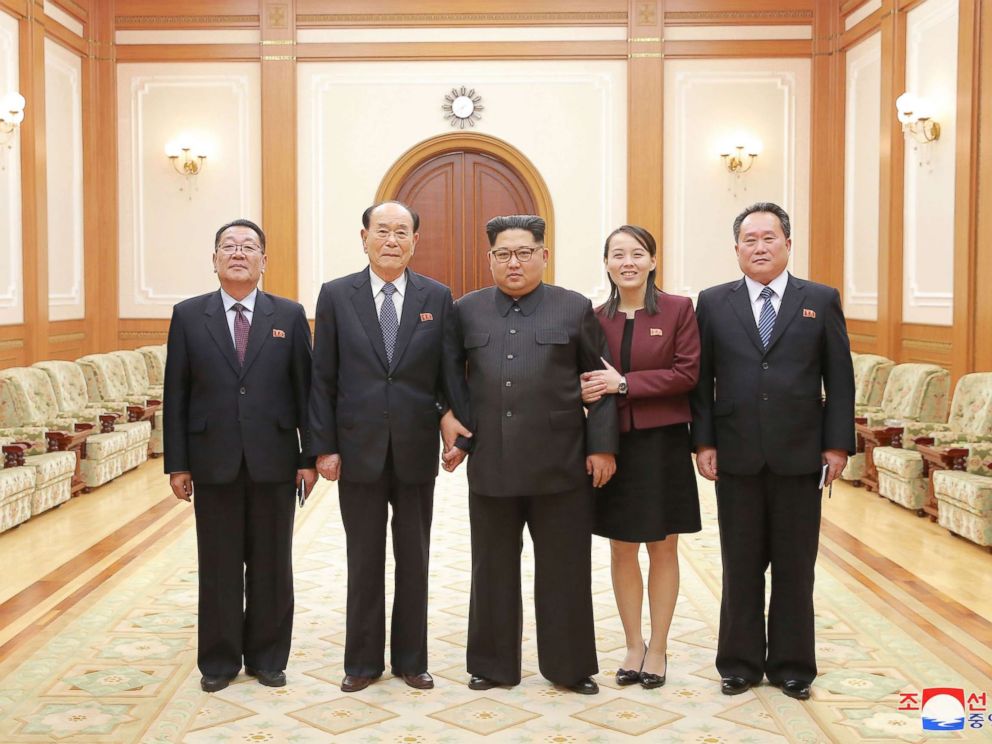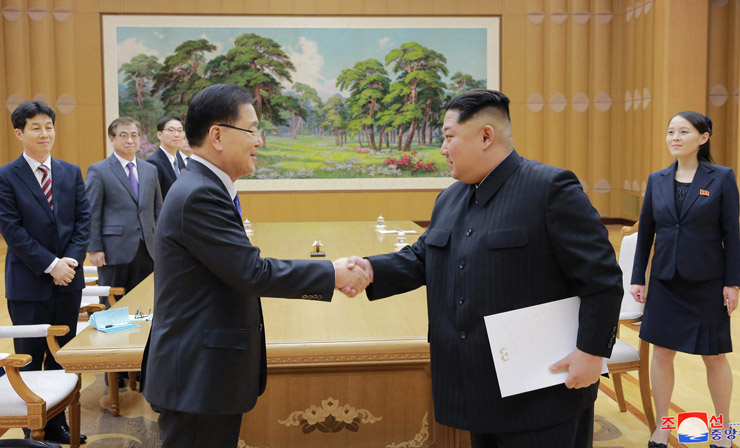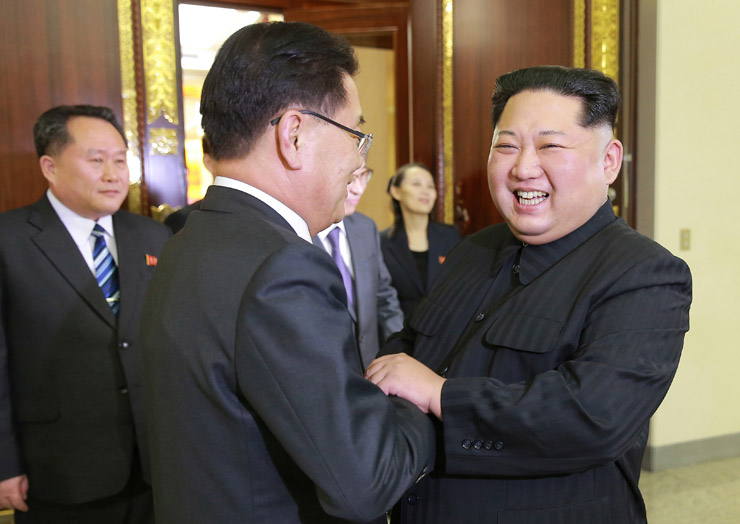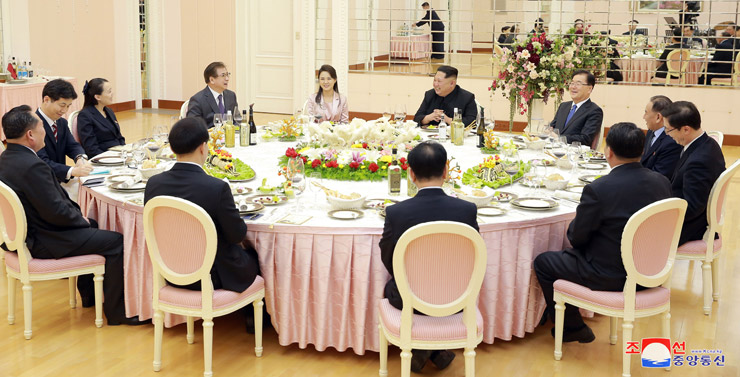http://www.aljazeera.com/news/2018/...th-korean-asylum-seekers-180218144353430.htmlDespite its reputation as a haven for refugees, Canada has been deporting North Korean asylum seekers who came to the country through South Korea.
Nearly 2,000 have been kicked out of the country since 2013 because the government says they lied on their asylum application forms. Another 150 Koreans are under imminent threat of deportation.
Install the app
How to install the app on iOS
Follow along with the video below to see how to install our site as a web app on your home screen.
Note: This feature may not be available in some browsers.
You are using an out of date browser. It may not display this or other websites correctly.
You should upgrade or use an alternative browser.
You should upgrade or use an alternative browser.
Korean Sota Osa II ?
- Viestiketjun aloittaja deeq
- Aloitus PVM
-
- Tagit
- etelä-korea korea pohjois-korea
https://www.cbsnews.com/news/north-koreans-backed-out-of-meeting-with-pence-at-the-olympics/North Korean officials "walked away from a meeting" with Vice President Mike Pence at the Winter Olympics in Pyeongchang, South Korea, according to the vice president's chief of staff.
Pence, who noticeably kept his distance from North Korean dictator Kim Jong Un's sister at the Olympics, had actually intended to meet with North Korean officials while at the games. Nick Ayers, Pence's chief of staff, confirmed in a statement to CBS News that North Korea "dangled a meeting" with Pence before cancelling. The scrapped meeting was first reported by the Washington Post.
Ayers suggested the North Koreans backed out because of the administration's determination to "stand in the way of Kim's desire to whitewash their murderous regime with nice photo ops at the Olympics."
https://nypost.com/2018/02/20/north-korean-skater-disqualified-after-shocking-crash-dirty-tactics/Short-track speed skating can look a bit like NASCAR on ice at times, and a competitor from North Korea put the spotlight on the crashing instead of the racing.
Jong Kwang Bom, a 17-year-old from Pyongyang, crashed a couple of seconds into a preliminary heat in the men’s 500 meters. He crashed so quickly they decided to restart the race.
He lasted a little longer on the second try, but still failed to complete a lap before tumbling and crashing into the outside wall.
What’s worse is both times it looked as if Jong was trying to sabotage Japanese skater Ryosuke Sakazume. On the first fall, Jong appeared to reach out and grab at Sakazume’s skate, which is a combination of dirty play and incredible danger.
Ongelma minkä Parhaan Korean Armeijan olympiaosallistujat kohtaavat on se että muut kilpailijat eivät harrasta likaisia taktiikoita, koska se syö liikaa aikaa ja saattaa aiheuttaa ongelmia viranomaisten kanssa. Mikä mahtaa odottaa näitä urheilijoita rajan takana? Uskon myös että jos katsomme takaisinpäin niin vastaavia tapauksia saattaa löytyä lisää muista sotilasurheilijoista.
https://www.theguardian.com/sport/2018/feb/25/north-korea-general-protests-olympics-visitNorth Korea has said it is willing to start direct talks with the US, with the move coming as a high-level delegation from Pyongyang, headed by a controversial general, arrived for the Winter Olympics closing ceremony.
Pyongyang also said the relationship between the two Koreas and US-North Korean ties should advance in tandem, according to South Korea’s presidential Blue House. The announcement on Sunday comes after president Moon Jae-in met the head of the North Korean delegation, Kim Yong-chol, vice-chair of the ruling Workers’ party’s central committee.
The eight-person team from North Korea includes officials responsible for its nuclear programme and, in a rare move, diplomats in charge of US issues.
https://www.washingtonpost.com/worl...76b4fe57ff7_story.html?utm_term=.527b226f23d7Russian military spies hacked several hundred computers used by authorities at the 2018 Winter Olympic Games in South Korea, according to U.S. intelligence.
They did so while trying to make it appear as though the intrusion was conducted by North Korea, what is known as a “false-flag” operation, said two U.S. officials who spoke on the condition of anonymity to discuss a sensitive matter.
Officials in PyeongChang acknowledged that the Games were hit by a cyberattack during the Feb. 9 Opening Ceremonies but had refused to confirm whether Russia was responsible. That evening there were disruptions to the Internet, broadcast systems and the Olympics website. Many attendees were unable to print their tickets for the ceremony, resulting in empty seats.
Aikamme vitsaus valtiolliset. En usko että paluuta normaaliolosuhteisiin tulee tapahtumaan ellei saada aikaan pitkää rauhaa. Mikä motivaatio naapurilla on lietsoa sotaa koreoiden välille? Vai oliko cyberoperaatiot seuraus Venäjän dopingskandaaleista?
Aikamme vitsaus valtiolliset. En usko että paluuta normaaliolosuhteisiin tulee tapahtumaan ellei saada aikaan pitkää rauhaa. Mikä motivaatio naapurilla on lietsoa sotaa koreoiden välille? Vai oliko cyberoperaatiot seuraus Venäjän dopingskandaaleista?
Jotenkin veikkaan, että putlerstanissa syyksi riittää, että "me voimme tehdä niin".
Jotenkin veikkaan, että putlerstanissa syyksi riittää, että "me voimme tehdä niin".
Joo, se vanha totuus. Vaihtaisivat levyä.
ido59
Majuri
. Mikä motivaatio naapurilla on lietsoa sotaa koreoiden välille?
Kun US:n (ja länsimaisen median) katse ja resut on PK:ssa, on putlerilla hieman vapaammat kädet toisaalla.
Jos US:n saisi provosoitua johonkin, mikä aiheuttaisi kansainvälistä paheksuntaa, nousisi putlerin suhteellinen moraali-maine tai ainakin 'oikeuttaisi' johonkin 'vastaavaan' sotilaalliseen siirtoon. Trollitehdastyöläisethän aina kääntävät keskustelun 'mutku usa'.
Korean kriisi hiertää myös maailman ainoiden supervaltojen Kiinan ja US keskinäistä luottamusta, toiminta- ja sopimusvapautta. Jos supereilla olisi yhteinen sävel, putlerin tila kävisi aika pieneksi.
Divide et impera.
https://www.theguardian.com/world/2...sile-and-chemical-weapon-items-says-un-reportNorth Korea sent Syria more than 40 items used in ballistic missile and chemical weapons programmes in the five years from 2012-17, a leaked UN report has said.
The panel of experts monitoring sanctions against North Korea said its investigations into Pyongyang’s transfer of prohibited ballistic missile, conventional arms and dual use goods found the previously unreported shipments.
It said an unnamed UN member state also reported evidence that Myanmar received a range of conventional weapons from North Korea including multiple rocket launchers and surface-to-air missiles in addition to ballistic missile systems.
https://boingboing.net/2018/02/27/north-korean-rulers-attempted.htmlBeing a despot sucks. International sanctions keep you from being able to import Game of Thrones DVDs or yellow cake uranium. No one ever tells you that there's food on your face and the anguished cries from your nation's gulags keep you and the rest of your family from getting a good night's rest. When you're not busy threatening the world with nuclear annihilation and when even having your enemies torn apart by dogs doesn't make you smile, it's time to melt away and take a vacation – get outta yer secretive nation!
Oh, if you happen to be from North Korea, you'll likely want to do it with a Brazilian passport.
According to Reuters, the despotic family of North Korean strongman Kim Jong Il attempted to leave their humanitarian crisis of a nation to visit western countries using illegally obtained Brazilian passports. It was long rumored that the Kims had been using forged travel documents for years to venture into the west in search of rest, relaxation and all of the shit that we don't want them to have because they're a terrible family doing horrendous things to millions of people. But up until now, no one, at least outside of the intelligence community, had ever seen any proof of it. That all changed this week when security sources provided Reuters with a photocopy of passports with Kim Jong Un and Kim Jong Il's photos in them. Unsurprisingly, the Brazilian government doesn't have much to say on the matter.
https://www.vox.com/world/2018/2/28/17055762/north-korea-sanctions-bitcoin-nuclear-weaponsThe US keeps imposing new sanctions on North Korea over its nuclear program but they’re not changing Kim Jong Un’s behavior — and for a surprising reason: Pyongyang’s skill at using cryptocurrencies.
Five days ago, America sanctioned dozens of ships, shipping companies, and other firms that allegedly help Pyongyang fund its nuclear and missiles programs. That move is part of a broader US strategy to starve the North Korean regime of money it would use to improve its weapons. The Trump administration wants to make these punishments so severe that Pyongyang would potentially be open to negotiations over the programs.
The problem is North Korea can partially skirt financial restrictions with cryptocurrencies, an online form of money, according to Priscilla Moriuchi, formerly a top National Security Agency official charged with overseeing cyber threats from East Asia.
Moriuchi estimates that North Korea earns between $15 million and $200 million by creating and selling cryptocurrencies and then turning it into hard cash. (Their take fluctuates depending on the digital currency’s worth when North Korea cashes out.) That’s not enough money to fully fund North Korea’s weapons programs, to be sure, but it ensures they don’t completely shut down.
https://yle.fi/uutiset/3-10101378Etelä-Korea lähettää delegaation Pohjois-Koreaan liennyttämään maiden välejä. Pohjois-Koreaan matkustaa maanantaina kymmenen edustajaa, muiden muassa Etelä-Korean tiedustelupalvelun johtaja ja presidentin turvallisuusneuvonantaja.
Tarkoituksena on edistää Pohjois-Korean ja Yhdysvaltain keskustelua ydinaseista. Pohjois-Koreassa vierailtuaan delegaation on määrä matkustaa Washingtonin keskustelemaan yhdysvaltalaisten kanssa.
Koreat ovat lähentyneet toisiaan alkuvuoden ja erityisesti helmikuussa Etelä-Koreassa järjestettyjen olympiakisojen aikana. Maiden joukkueet muun muassa marssivat yhdessä kisojen avajaisissa, joissa vierailivat myös joukko pohjoiskorealaisia korkeita virkamiehiä sekä Pohjois-Korean johtajan Kim Jong-unin sisar.
Pohjois-Koreaa hallitsevan suvun jäseniä ei ollut nähty etelänaapurissa sitten Korean sodan.
http://www.chicagotribune.com/news/...orea-sanctions-shell-game-20180303-story.htmlThe rusting seaport called Kholmsk is one of the sleepiest harbors in Russia's Far East, a place that sees more full moons than coal ships in a typical year. Yet for a few weeks late last summer, this tiny port was chockablock with vessels hauling outlawed North Korean coal.
At least four ships of different flags showed up in August and September to dump North Korean anthracite onto a pile near the harbor's southern tip, maritime records show. Then, six other ships arrived to pick up coal from the same spot and deliver it to foreign markets. Between the voyages, the harbor was witness to a kind of magic trick: Illicit North Korean coal was transformed into Russian coal, which can be legally sold anywhere.
Some of it ended up in the most unexpected of places: South Korea and Japan, two of Pyongyang's main rivals.
"They literally 'laundered' the coal," said a Western diplomat, speaking on the condition of anonymity to describe new details from a confidential U.N. investigation of the incident. "It's the same tactic criminals use to launder ill-gotten cash."
"We spend so much of our time trying to put obstacles in the way of North Korea, and in making the obstacles higher and wider," Berger said, "but the North Koreans are simply very practiced at getting around whatever we put in their path."


Presidentti Moon ja Presidentti Kim Young Nam
https://yle.fi/uutiset/3-10103333Pohjois-Korean johtaja Kim Jong-un ilmoittaa haluavansa edistää suhteita Etelä-Korean kanssa, kertoo Pohjois-Korean uutistoimisto KCNA. Pohjois-Korea haluaa liennyttää maiden välejä ja ryhtyä käytännön toimiin sen puolesta.
Tavoitteena on toimiston mukaan vähentää jännitteitä Korean niemimaalla sekä lisätä maiden keskinäistä vuoropuhelua, yhteydenpitoa, ja yhteistyötä. Tarkoituksena on myös "kirjoittaa uutta historiaa" Etelä-Korean kanssa.
KCNA viittasi maiden väliseen korkean tason tapaamiseen, jossa allekirjoitettiin sopimus. Sopimuksen sisällöstä KCNA ei sen sijaan antanut mitään yksityiskohtaista tietoa, kertoo uutistoimisto Reuters.
Etelä-Korean valtuuskunta matkusti Pohjois-Korean pääkaupunkiin Pjongjangiin maanantaina. Koreoiden tapaaminen näin korkealla tasolla on harvinaista, mutta Pohjois-Korean johtajan osalllistuminen keskusteluun on vieläkin ainutlaatuisempaa. Kim Jong-un oli poikkeuksellisesti mukana koko tapaamisen ajan.
http://abcnews.go.com/International...e-leader-kim-jong-meets-1st/story?id=53526171
Viimeksi muokattu:
North Korea
https://www.theguardian.com/world/2...or-vigorous-efforts-to-calm-military-tensionsis willing to discuss relinquishing its nuclear weapons, and will freeze its nuclear and missile programmes if it begins direct talks with the US, in a dramatic easing of tensions after a visit by senior South Korean politicians.
The North Korean leader, Kim Jong-un, will also meet his South Korean counterpart, Moon Jae-in, in late April in the first summit of its kind in more than a decade, Moon’s office said. The two leaders will meet at Panmunjom on the highly militarised border.
North Korea pledged to not use conventional or nuclear weapons against its neighbour, despite frequent threats from Pyongyang. The two sides have remained in a technical state of war since the 1950-53 Korean war.
“The North side clearly affirmed its commitment to the denuclearisation of the Korean Peninsula and said it would have no reason to possess nuclear weapons should the safety of its regime be guaranteed and military threats against North Korea removed,” a South Korean presidential spokesman said, according to the Yonhap news agency.
“The South and the North have agreed to set up a hotline between their leaders to allow close consultations and a reduction of military tension, while also agreeing to hold the first phone conversation before the third South-North summit.”
Koreoiden tapaaminen meni ilmeisesti vähän kuin Putte-possun nimipäivät: kaikilla oli niin mukavaa. Saa nähdä, josko tästä kehkeytyy jotain positiivista kehitystä pidemmäksikin aikaa, vai jääkö varsinkin Etelä-Korean presidentti Moonin pyrkimys maiden välien parantamiseksi suutariksi.






Koreoiden tapaaminen meni ilmeisesti vähän kuin Putte-possun nimipäivät: kaikilla oli niin mukavaa. Saa nähdä, josko tästä kehkeytyy jotain positiivista kehitystä pidemmäksikin aikaa, vai jääkö varsinkin Etelä-Korean presidentti Moonin pyrkimys maiden välien parantamiseksi suutariksi.



Ei jää suutariksi vaan kyseessä on täsmäpommi jonka lähettää pullukka. Tämä aktiivinen ja voimakas liennytys on taktiikka. Ne tekevät ydinaseita ja liennyttävät välit etelään. Kuka ne haluaa rikkoa kun Usa on sormi liipasimella. Tässä käy niin että Etelä ei tunne uhkaa P-korean ydinohjuksista. Etelää ulkoistetaan koko asiasta.
Nerokasta.
D
Deleted member 1079
Guest
Kimillä pelko persuuksissa mahdollisen sotaoperaation vuoksi?
Vai mistä nyt tuulee, ajanpeluuta?
Kim Jong-unilta jättiyllätys: Pohjois-Korea on valmis luopumaan ydinaseista
KASPERI SUMMANEN | 07.03.2018 | 10:54- päivitetty 07.03.2018 | 11:41
Diktaattorin kerrotaan ilmaisseen selvästi valmiutensa luopua ydinaseista.
Pohjois-Korean johtajan Kim Jong-unin kanssa Pjongjangissa tällä viikolla neuvotelleen eteläkorealaisen delegaation mukaan Pohjois-Korea on ”ilmaissut selkeästi valmiutensa luopua ydinaseista”.
– Se (Pohjois-Korea) teki selväksi, ettei sillä olisi mitään syytä säilyttää ydinaseitaan, mikäli sotilaallinen uhka Pohjois-Korealle poistetaan ja sen turvallisuus taataan, Etelä-Korean presidentin Moon Jae-inin kanslian tiedotteessa todetaan New York Timesin mukaan.
Pohjoiskorealaisten kerrotaan viestittäneen myös valmiudestaan hyllyttää ydinkokeet ja avata dialogin Yhdysvaltojen kanssa.
Mikäli Pohjois-Korea vahvistaa lausunnon sisällön, on kyse suoranaisesta jymy-yllätyksestä. Pohjois-Korean johto on sitonut arvovaltansa ydinaseiden kehittämiseen jo pitkään. Ydinaseet ovat myös olennainen osa maan propagandaa ja Kimin klaanin henkilökulttia.
Pohjois-Korean riisumista ydinaseista on pidetty käytännössä mahdottomana ilman jonkinlaista vallanvaihdosta. Kim Jong-unin hallinto on viestittänyt useasti pitävänsä ydinaseita ainoana keinona välttää ulkovaltojen yritykset vaikuttaa maan sisäisiin asioihin.
Vai mistä nyt tuulee, ajanpeluuta?
Kim Jong-unilta jättiyllätys: Pohjois-Korea on valmis luopumaan ydinaseista
KASPERI SUMMANEN | 07.03.2018 | 10:54- päivitetty 07.03.2018 | 11:41
Diktaattorin kerrotaan ilmaisseen selvästi valmiutensa luopua ydinaseista.
Pohjois-Korean johtajan Kim Jong-unin kanssa Pjongjangissa tällä viikolla neuvotelleen eteläkorealaisen delegaation mukaan Pohjois-Korea on ”ilmaissut selkeästi valmiutensa luopua ydinaseista”.
– Se (Pohjois-Korea) teki selväksi, ettei sillä olisi mitään syytä säilyttää ydinaseitaan, mikäli sotilaallinen uhka Pohjois-Korealle poistetaan ja sen turvallisuus taataan, Etelä-Korean presidentin Moon Jae-inin kanslian tiedotteessa todetaan New York Timesin mukaan.
Pohjoiskorealaisten kerrotaan viestittäneen myös valmiudestaan hyllyttää ydinkokeet ja avata dialogin Yhdysvaltojen kanssa.
Mikäli Pohjois-Korea vahvistaa lausunnon sisällön, on kyse suoranaisesta jymy-yllätyksestä. Pohjois-Korean johto on sitonut arvovaltansa ydinaseiden kehittämiseen jo pitkään. Ydinaseet ovat myös olennainen osa maan propagandaa ja Kimin klaanin henkilökulttia.
Pohjois-Korean riisumista ydinaseista on pidetty käytännössä mahdottomana ilman jonkinlaista vallanvaihdosta. Kim Jong-unin hallinto on viestittänyt useasti pitävänsä ydinaseita ainoana keinona välttää ulkovaltojen yritykset vaikuttaa maan sisäisiin asioihin.
Kimillä pelko persuuksissa mahdollisen sotaoperaation vuoksi?
Vai mistä nyt tuulee, ajanpeluuta?
...
Pohjois-Korean johtajan Kim Jong-unin kanssa Pjongjangissa tällä viikolla neuvotelleen eteläkorealaisen delegaation mukaan Pohjois-Korea on ”ilmaissut selkeästi valmiutensa luopua ydinaseista”.
– Se (Pohjois-Korea) teki selväksi, ettei sillä olisi mitään syytä säilyttää ydinaseitaan, mikäli sotilaallinen uhka Pohjois-Korealle poistetaan ja sen turvallisuus taataan, Etelä-Korean presidentin Moon Jae-inin kanslian tiedotteessa todetaan New York Timesin mukaan.
Lieneekö tuossa takana sen kummempaa kuin pyrkimys vaihtokauppaan: ydinaseet pois Pohjois-Koreasta, jos vastavuoroisesti USA poistuu Etelä-Koreasta. Jotain tuon tapaistahan Pohjois-Korean haluama "sotilaallisen uhkan poistaminen" käytännössä tarkoittanee. Etelä-Korea voisi(?) tuollaiseen diiliin suostuakin, koska sen asevoimien pitäisi nykyisin yksinäänkin olla varsin riittävä pelote Pohjois-Koreaa vastaan.
Rajajääkäri
Ylipäällikkö
Lieneekö tuossa takana sen kummempaa kuin pyrkimys vaihtokauppaan: ydinaseet pois Pohjois-Koreasta, jos vastavuoroisesti USA poistuu Etelä-Koreasta. Jotain tuon tapaistahan Pohjois-Korean haluama "sotilaallisen uhkan poistaminen" käytännössä tarkoittanee. Etelä-Korea voisi(?) tuollaiseen diiliin suostuakin, koska sen asevoimien pitäisi nykyisin yksinäänkin olla varsin riittävä pelote Pohjois-Koreaa vastaan.[/QUOTE
Rajajääkäri:
Tai huomanneet, ettei heidän talous ja resurssit riitä, saada ydinohjuksia toimimaan.
